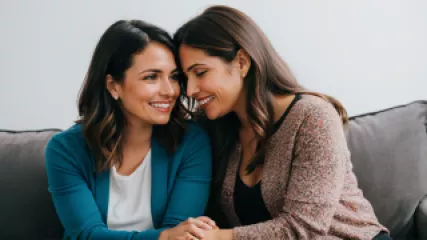How to Prioritize Emotional Support in Friendships
How to Prioritize Emotional Support in Friendships
In the ever-evolving landscape of modern relationships, the importance of prioritizing emotional support in friendships cannot be overstated. Hallie Frazier, a licensed clinical therapist specializing in interpersonal dynamics, sits down with us to explore the intricacies of nurturing meaningful connections and fostering emotional resilience within our social circles.
Defining Emotional Support in Friendships
Emotional support, as Hallie Frazier explains, is the bedrock of deep and fulfilling friendships. "It's the ability to be vulnerable with one another, to provide a safe space for shared experiences, and to offer empathy, validation, and compassion when our friends are going through difficult times," she says. "Emotional support is what transforms a casual acquaintance into a trusted confidant."
Oftentimes, the key to nurturing emotional support lies in the small, everyday gestures that demonstrate care and concern. "It's checking in on a friend who's been going through a tough breakup, or making the time to listen without judgment when they need to vent," Frazier notes. "It's validating their feelings, offering a shoulder to lean on, and being present in the moments that matter most."
The Importance of Emotional Support in Friendships
Emotional support in friendships is not just a nice-to-have; it's a fundamental aspect of our well-being and personal growth. As Frazier explains, "When we feel emotionally supported by our friends, it fosters a deep sense of belonging, trust, and security. It's like having a safety net – a group of people who truly 'have our back' and who we can count on during life's ups and downs."
Beyond the immediate benefits, the long-term implications of emotional support in friendships are far-reaching. "Research has shown that strong social connections and emotional support are closely linked to improved mental health, increased resilience, and even better physical health outcomes," Frazier says. "Friendships that prioritize emotional support can be a potent antidote to loneliness, depression, and anxiety."
Navigating the Challenges of Emotional Support
While the importance of emotional support in friendships is clear, Frazier acknowledges that it's not always easy to achieve. "Cultivating deep, emotionally supportive friendships requires vulnerability, empathy, and a willingness to be present for one another, even when it's uncomfortable," she explains. "It's about finding the right balance between being there for our friends and also maintaining healthy boundaries."
One common challenge, Frazier notes, is the fear of being a "burden" to our friends. "Many people, especially those who have experienced emotional neglect or trauma, struggle with the idea of asking for help or support. They worry that they're imposing or that their friends won't have the capacity to handle their emotions." Overcoming this hurdle, she says, is essential for building truly supportive friendships.
Strategies for Cultivating Emotional Support in Friendships
So, how can we prioritize emotional support in our friendships? Frazier offers the following strategies:
- Cultivate Self-Awareness: "It's important to understand our own emotional needs and communication styles. This helps us articulate what we need from our friends and set appropriate boundaries."
- Practice Active Listening: "When a friend is sharing something difficult, resist the urge to problem-solve or offer unsolicited advice. Instead, focus on truly listening, validating their feelings, and providing a compassionate presence."
- Foster Vulnerability: "Emotional support is a two-way street. By opening up and sharing our own struggles, we create opportunities for deeper connections and mutual understanding."
- Celebrate Small Wins: "Recognizing and acknowledging our friends' achievements, no matter how seemingly minor, can go a long way in building a culture of positivity and encouragement."
- Prioritize Quality Time: "Making the time to connect, whether it's a coffee date or a virtual hangout, reinforces the importance of the friendship and provides a dedicated space for emotional support."
- Seek Professional Help if Needed: "If we're struggling to maintain healthy friendships or to provide the level of support our friends need, it may be beneficial to seek the guidance of a licensed therapist or counselor."
The Role of Online Platforms in Emotional Support
In the digital age, the ways in which we connect and provide emotional support to our friends have evolved. Frazier notes that "online platforms and virtual interactions can actually play a meaningful role in fostering emotional support, especially for those who may have difficulty accessing in-person support networks."
She cites the growing popularity of online therapy and counseling services as an example. "These platforms allow people to connect with licensed professionals and receive tailored support for their personal and interpersonal challenges, without the logistical barriers of traditional in-person therapy."
Additionally, Frazier highlights the potential of online communities and peer-to-peer support groups. "By joining online forums or discussion groups centered around shared experiences or mental health concerns, people can find a sense of belonging and access emotional support from individuals who truly understand what they're going through."
Of course, Frazier acknowledges the limitations of online interactions and the importance of maintaining a healthy balance between virtual and in-person connections. "While online platforms can be a valuable supplement, they should not replace the depth and richness of face-to-face friendships and the emotional support they provide."
Fostering Emotional Resilience in Friendships
Ultimately, Frazier believes that prioritizing emotional support in friendships is not just about enhancing the quality of our interpersonal relationships – it's about cultivating emotional resilience and personal growth.
"When we feel emotionally supported by our friends, it empowers us to take healthy risks, to be our authentic selves, and to navigate life's challenges with greater confidence and grace," she says. "It's about building a network of trusted allies who can help us weather the storms and celebrate the triumphs, fostering our own well-being and personal development in the process."
As we continue to navigate the complexities of modern social dynamics, Frazier's insights serve as a poignant reminder of the profound impact that emotionally supportive friendships can have on our lives. By embracing vulnerability, practicing active listening, and nurturing a culture of mutual care, we can unlock the true transformative power of friendship.






